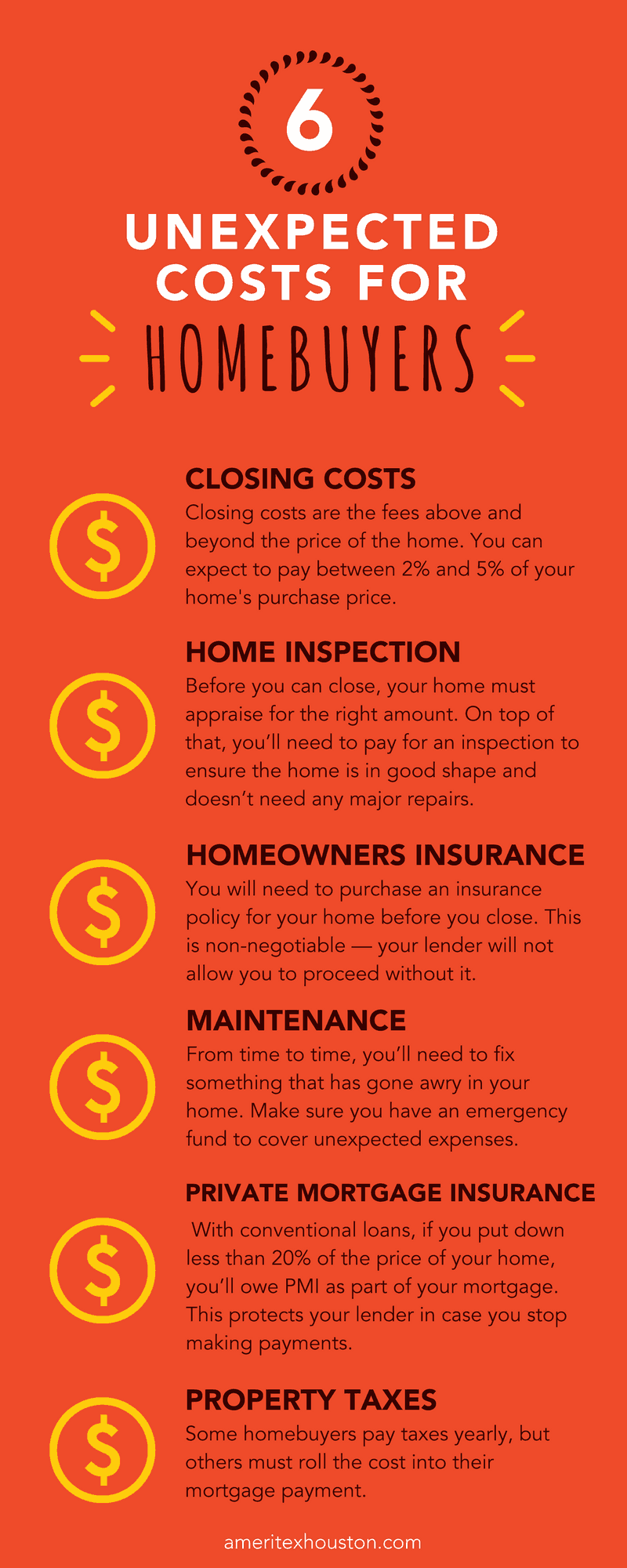If you’re a first-time homebuyer — or if it’s been a while since you last purchased a home — navigating exactly what you owe can be tricky. Understanding unexpected costs can help you avoid sticker shock and stay on budget.
Check out the infographic and keep reading to find out the most common homebuying costs.

Unexpected Homebuying Costs
1. Closing Costs
Closing costs are the fees above and beyond the price of the home. Both the buyer and the seller owe closing costs at the time of the real estate sale. You can expect to pay between 2% and 5% of your home’s purchase price.
Here are some specific items associated with the buyer’s closing costs:
- Closing Fee
- Courier Fee
- Credit Report
- Escrow
- Flood Determination/Life Of Loan Coverage
- Interest
- Lender Fees
- Survey Fee
- Title Search or Exam Fee
- Title Insurance
At close, your title company’s representative will explain all charges to you in detail. You should have a good idea of closing costs well before the actual date. If the charges seem too steep, you can sometimes negotiate and have the seller pay for some of the closing costs. In addition to that, many lenders give you the option of rolling your closing costs into your mortgage payment.
2. Home Inspection and Appraisal
Before you can close, your home must appraise for the right amount. On top of that, you’ll need to pay for an inspection to ensure the home is in good shape and doesn’t need any major repairs. (If it does, you can then negotiate with the seller.)
Both services will cost you a few hundred dollars in addition to the other homebuying costs.
3. Homeowners Insurance
You will need to purchase an insurance policy for your home before you close. This is non-negotiable — your lender will not allow you to proceed without it. However, you should thoroughly research your options and get several quotes. All companies and policies are not equal.
4. Maintenance and Repairs
From time to time, you’ll need to fix something that has gone awry in your home. Make sure you have an emergency fund to cover unexpected expenses. A good rule of thumb is to set aside about 4% of your home’s purchase price. That may seem like a lot, but it will be a lifesaver when something in your home needs repairing or replacing.
5. Private Mortgage Insurance
Private mortgage insurance (PMI) can come as quite a shock if you don’t know about it. With conventional loans, if you put down less than 20% of the price of your home, you’ll owe PMI as part of your mortgage. This protects your lender in case you stop making payments. Typically, you’ll pay between 0.5% to 1% of your purchase price annually.
6. Property Taxes
Some homebuyers pay taxes yearly, but others must roll the cost into their mortgage payment. Pay careful attention to the tax rate before you make an offer. This number can set you back several thousand a year.
When it comes to buying a home, it’s important to think beyond your loan principal, interest, and down payment. Being informed will help you avoid sticker shock and budget successfully for those unexpected homebuying costs.
If you’re buying a house, don’t forget to hire professional local movers! Call Ameritex at 713.484.6683 for more information and a free moving quote.
